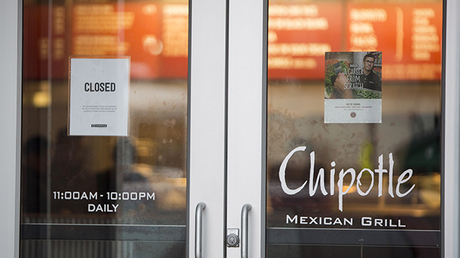
Today's announcement that Chipotle will temporarily close its entire system on Feb. 8 for a few hours of food safety training was only the latest development for a chain that's made headlines with a string of health incidents.
Just before Christmas, the Centers for Disease Control and Prevention notified the fast-casual chain that it was under investigation for five E. coli incidents in North Dakota, Oklahoma and Kansas. Chipotle's woes started last August, when 100 California customers fell ill from norovirus and another 64 were sickened by salmonella in Minnesota.
But while the chain's planned systemwide shutdown to watch an all-company meeting indicates an obvious willingness to confront the problem, the decision raises another issue: Is such a bold public move a good idea for the brand?
Even before announcing an hours-long closure to focus on food safety, Chipotle had already been moving to counter the perception that its food was potentially unsafe. The chain announced an "enhanced food safety program" in December and vowed that its guidelines would be "at the forefront of food safety protocols in the restaurant industry."
"When I opened the first Chipotle 22 years ago, I offered a focused menu of just a few things made with fresh ingredients and prepared using classic cooking techniques," Chipotle chairman and co-CEO Steve Ells said in a December statement. "We do the same thing today, even with nearly 2,000 restaurants, and we are working harder than ever to ensure that our food is safe and delicious."
But investors and customers don't seem to share Ells' confidence, with the chain seeing a reported 30 percent sales drop and 40 percent decline in stock price since the health issues arose.
With announcements of the new safety program and brief closure, will consumers appreciate the chain's transparency, or is the company only miring itself further in a problem it's trying to gain distance from?
The answer seems to be: Yes to both.
Brand experts who spoke to Adweek were divided between applauding the chain and shaking their heads over the closure decision, and that's likely the kind of split response Chipotle can expect from consumers.
'The Right Thing to Do'
"It's a good idea," said Bruce Winder, partner in the Retail Advisors Network. "It shows customers how serious it is taking the issue. It sends a clear message that something significant is changing, and it shows that the company put food safety and quality ahead of profits, [especially] as consumers realize they are losing sales the day they closed."
Hayes Roth, principal of HA Roth Consulting, adds that Chipotle's opting for such a public solution is in keeping with its brand ethos.
"One of their brand standards is transparency-they have preached that over the years," he said. "So for them to do this in in the brand character. It's the right thing to do. It's not just a smart move, but companies that have a really good ethical standard just do it."
There is, in fact, precedent for such a move. In 2008, Starbucks shut its system down for three hours to conduct staff training. However, the suspension of business was to teach the "art of espresso" and improve the "Starbucks Experience," to quote Starbucks' CEO Howard Schulz-not for something as potentially controversial as food safety procedure.
A Step Too Far? Or Not Far Enough?
Chipotle has a much bigger problem on its hands than Starbucks did in 2008, and some believe that closing down stores-however smart it may be operationally-carries a degree of risk.
One of those risks is creating another story about food-safety problems that'll resonate in the echo chamber of the Internet.
"Certainly it's a dramatic attempt to make clear how seriously they take the issue," said Charlie Hopper, principal at ad agency Young & Laramore. "The only concern is the 24-hour social-media-fed news machine has convinced us the situation is out of control and Chipotle is powerless to figure the problem out. So unless they emerge from this closure with a sensible, believable solution, this will just be one more unhappy episode for them."
Indeed, some experts believe Chipotle is only entrenching itself further in an already bad PR problem.
Adam Padilla, CEO of BrandFire, believes that Chipotle is making a "respectable long-term play" by "admitting that systems are wrong and something has to be corrected." But, he cautions: "In the short term that can damage reputations. It's almost like a martyrdom, saying, 'I screwed up and my visibility is high,' when public perception is already very low."
Bringing the Brand's Core Into Question
Another concern is the implication that food safety hasn't been a top concern until now.
"With everything that Chipotle has done, this is almost a little too late," says Aaron Kwittken, global chairman and CEO of communications firm Kwittken. "It does beg the question in consumers' minds, 'Why do they have to have special training? Isn't this part of their normal everyday processes?' This issue probably requires changes in their leadership team and their processes. They're reacting, they're not ahead of anything.
"Plus," Kwittken says, "February 8 is still so far away, and if they were smart they would share with the public exactly what the training or retraining entails and also what their core trainings are that are part of who they are outside of this special training."
Whatever the training entails, Chipotle has already lost customers like Colman Andrews, editorial director of The Daily Meal. "This is obviously a major, major problem for a chain that has set such high standards for itself-especially since, as Steve Ells himself has admitted, the very fact of sourcing so many ingredients from small local producers, a cornerstone of the Chipotle philosophy, increases the possibility of contamination. I like Chipotle, and wish them well in their endeavors, but let's just say I won't be eating a Chipotle burrito in my VW Diesel Passat any time soon."
